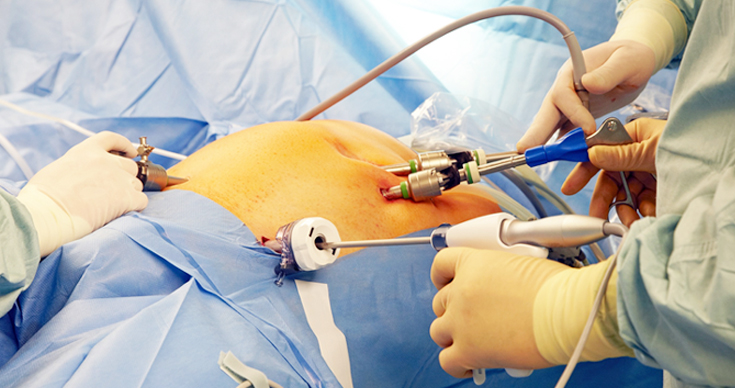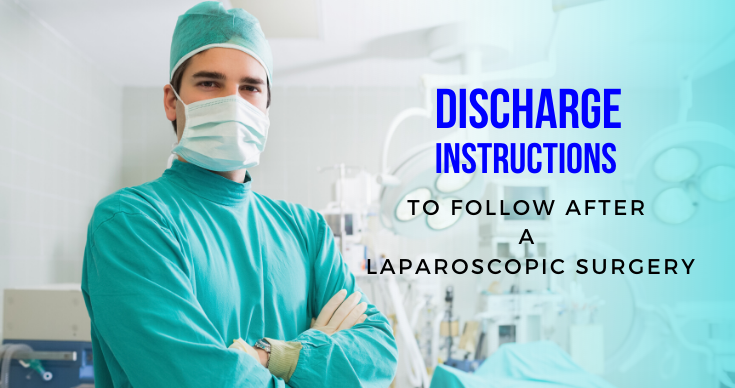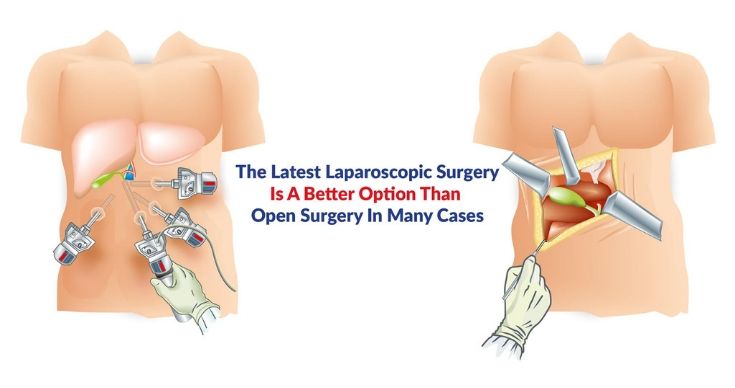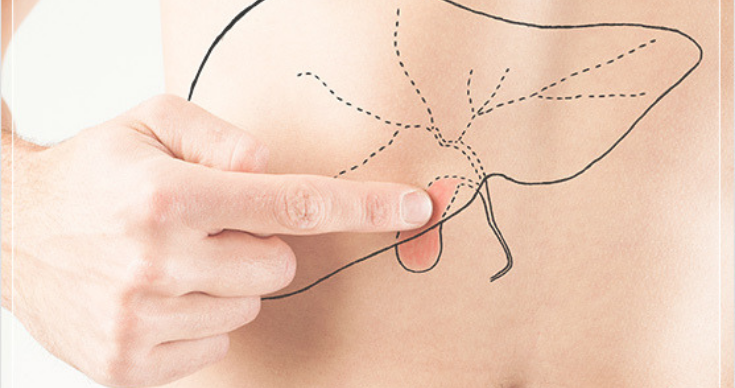Everything You Should Know About Minimally Invasive Surgery or Most commonly known as Key-Hole Surgery/Laparoscopic Surgery
Minimally invasive surgery which is most commonly known as the Key-Hole Surgery or Laparoscopic Surgery, is a specialised and advanced technique for conducting surgeries. This has been a popular technique for gynaecological procedures as well as gallbladder surgery. Laparoscopic surgery is one of the common types of minimally invasive surgeries, conducted by making small incisions, using tiny cameras, small tubes and surgical instruments. Constant innovations in the industry has led to these surgeries being shorter, with a faster recovery time, less invasive and painful along with fewer complications.
Scope of Key-hole Surgery / Minimally Invasive Surgery

Key-hole Surgery / Laparoscopic Surgery has been a popular choice for gynaecological procedures and gallbladder surgery. However, over the years, the scope for this key-hole surgery / minimally invasive surgery has increased to cater to many other surgical procedures. Now there’s scope for laparoscopic surgery for small and large intestinal surgeries, hernia repair, treatment for infertility. It is also used for diagnostic purposes like knowing the stages of cancer, checking for tumours or evaluation of the effectiveness of some treatment.
Advantages of Key-Hole Surgery / Minimally Invasive Surgery
In traditional open surgery, the doctor makes a large cut for visibility of organs and then operates on the patient. In case of minimally invasive surgery, here are some advantages that make it a better choice over traditional surgery:

- The surgeon can limit the number of cuts, the size of the incisions made and is considered much safer than traditional open surger
- The recovery period after a minimally invasive surgery is faster with smaller incisions leading to tiny or negligent scarring
- Not a lot of muscle or skin is opened up or affected, especially in key-hole surgery. The robotic surgeries are done with extreme precision
- The chances of complications also reduce in case of minimally invasive surgery, be it laparoscopic surgery or minimally invasive surgery
Along with the benefits, there is scope for major innovation and betterment of the current procedures, which is being worked on every minute by various surgeons all over the world. Minimally invasive surgery makes it easier for the patient and as well as the doctors and is the best solution to your issues. ILS Hospitals being the pioneers in laparoscopic surgery has been a leading hospital in Kolkata with renowned surgeons and facilities for key-hole surgery or minimally invasive surgery. To consult or know more about minimally invasive surgery, visit www.ilshospitals.com.
Laparoscopic Surgical Procedures Available At ILS Hospitals
Everything changes with time. Every consecutive day, we find new medical researches setting their mark in the field of medical science. Laparoscopic surgery is the most modern method of surgery after robotic surgery. To perform laparoscopic surgeries, special surgical equipment, expert laparoscopic surgeons, and a computer monitor are required.
In laparoscopic surgery, the laparoscopic surgeons operate on the patient’s body by making minute surgical incisions and viewing the inside of the body through a laparoscope (camera) on a computer screen.
ILS Hospitals stands for Institute of Laparoscopic Surgery. We provide minimally-invasive surgeries or laparoscopic surgery to our patients in Kolkata and Agartala. There are countless benefits of laparoscopic or keyhole surgery over traditional general surgery.
- No blood loss
- Less pain
- No scars
- Better cosmetic appearance
- Speedy recovery
- Early discharge
- No complications
- Higher success rate
- Quick return to normal life
- Inexpensive
Here is a list of some of the laparoscopic surgical procedures available in our hospital units – Dum Dum, Salt Lake, Howrah, and Agartala.
Laparoscopic Gallbladder Stone Surgery
Gallstones are a recurring problem. To prevent gallstones from developing again, we remove the gallbladder (either partially or completely) as a permanent gallstone treatment. Humans can survive without a gallbladder.
Laparoscopic Hernia Treatment
Hernia is a common medical condition in our country, India. At ILS Hospitals, we ensure to provide optimum laparoscopic hernia repair surgery to our patients.
Laparoscopic Bariatric Surgery
Obesity has become alarmingly high in India. To treat obesity and its related ailment we provide laparoscopic bariatric surgery or weight loss surgery to our patients in Kolkata and Agartala. We have performed diabetes surgery successfully on more than a thousand patients.
Laparoscopic Hysterectomy
Laparoscopic Hysterectomy is the minimally-invasive surgery for removal of the uterus (womb). This is strictly done on the account of medical reasons. We are pleased to announce that we offer MIGS (Minimally Invasive Gynaecologic Surgery) to the patients under the guidance of Dr Aruna Tantia.
With the aid of laparoscopic surgery, an operation has become no longer scary and painful. Get minimally-invasive surgery only from ILS Hospitals, the best laparoscopic surgery hospital in Kolkata and Agartala.
Discharge Instructions To Follow After A Laparoscopic Surgery
Laparoscopic surgery is a surgery in which the laparoscopic surgeons use special surgical tools and make few smaller incisions to treat a person. Laparoscopic or minimally-invasive surgery is known for its immense benefits as follows:
-
Speedy recovery
-
Less blood loss
-
No or minimal pain
-
Low chances of infection
-
No or less discomfort
-
Higher rate of success
-
Early discharge
-
Cost-effective.
After any laparoscopic surgery, the patients get certain discharge instructions from their laparoscopic surgeons. The recovery time is different for each patient, but, in general, it is much faster than traditional open surgery. Today, ILS Hospitals would like to share the general discharge instructions that need to be followed post laparoscopic surgery. So let’s look at the discharge instructions that a patient must follow post keyhole surgery for a quicker recovery.
1. Consuming a soft diet:
A bland and nutritious soft diet has to be followed after a person undergoes minimally-invasive surgery. Soft foods are good because they are digestible and aids faster recovery as your body does not have to work hard for digesting food. The food should be cooked with less oil and spices. Some of the examples can be boiled and mashed- potatoes, vegetables, rice, peeled fruits, poached eggs, strained vegetables and meat soups, fruit juices, porridge or dalia, pureed dal, lentils or masoor ki dal, and so on depending on the patient’s choice.
2. Avoiding certain foods:
Some foods should be avoided or else they may delay the patient’s recovery. Some of them are fried and oily foods, fatty foods (like red meat), spicy foods, and stale foods as they may cause indigestion, heartburn, and acidity. Also, there’s no question of eating roadside and outside food, so home-cooked food is your only good companion.
3. Taking medications on time:
No matter wherever you go, when it comes to timely medications, doctors from different hospitals are on the same page.
4. Avoiding overstrenuous activities:
It is important to not overexert the body post any surgery. The incisional site is still raw and not completely healed, so all sorts of vigorous activities (outdoor sports, running, moving furniture, carrying heavy weights, climbing stairs, jumping etc.) need to be postponed for some time.
5. Taking care of the incisional region:
The incision, even though minute, must be taken care of by keeping it clean, dry and safe. Do not scrub, scratch and disturb the surgical incisions site and wear loose-fitting comfortable clothes. Never expose the surgical site to sunlight.
After any laparoscopic or minimally-invasive procedure, please get proper discharge instructions from your doctor or medical professional for better recovery. You can get your laparoscopic treatment done from experienced laparoscopic surgeons at ILS Hospitals in Kolkata and Agartala.
The Latest Laparoscopic Surgery Is A Better Option Than Open Surgery In Many Cases
We live in an era of medical science when it is constantly improvising to enhance our lives. On one hand traditional, open surgery has been a very useful treatment approach to treat a range of illness for centuries, however, laparoscopic surgery is substituting many open surgery procedures at a fast pace. Today, we will discuss laparoscopic surgery and list out why it is a more beneficial option these days.
Laparoscopic surgery is also known as minimally invasive surgery, or keyhole surgery or band-aid surgery. It is carried out by making a few minute holes on the abdominal area rather than making a large slit like it is done in open surgery. The procedure starts by inflating the stomach using some carbon dioxide gas. This offers two advantages- it helps the surgeons have visuals and working space to carry out the operation. The surgeons insert several instruments through these holes, including a laparoscope, camera, light, and other equipment.
The camera captures the visuals from inside the body and projects it on the screen. The doctor uses this visual to guide the instruments inside the body and performs the surgery. After it is done, the instruments are retracted back and the abdominal cavity is deflated by extracting the gas out. The minute incisions are stitched back and thereby completes the surgery procedure.
There are many advantages associated with laparoscopic surgery.
- It mitigates the need for a prolonged hospital stay as it often involves fewer complications. The patients are generally allowed to return to their home within 2-3 days of the surgery.
- It reduces surgery risks such as bleeding, infection, nearby organ perforation, etc due to the much smaller incisions.
- As it involves no large stitches, usually the chances of forming hernia in the future are less (which is otherwise is a high-risk factor associated with open surgery).
- It is aesthetically better. Laparoscopic Surgery leaves only 2-3 minute incision marks, which looks a lot better than having large stitch marks.
- The minute incisions ensure minimal bleeding and hence, blood transfusion is often not required during these surgical procedures. For the same reason, it is also known as a bloodless procedure.
- This surgery technique does not lead to the organ’s exposure during the procedure. As a result, it mitigates the risk of infection during and after surgery.
- Due to all these above-mentioned factors, laparoscopic surgery offers much faster recovery. It enables the patient to resume their daily life within a few weeks time period. This results in much lesser absence from work and personal life.
At ILS Hospitals, we offer a wide range of medical surgery through the laparoscopic technique. Our eminent surgeon offers minimally invasive surgery for various medical specializations. We are all thrived to ensure that the patients gain the maximum benefit out of the procedure.
Do You Need A Gallbladder Surgery To Cure Your Gallstones?
Your occasional stomach pain and digestion troubles not resolving even with home remedies and over-the-counter medicines? Are you certain it is not your gallstones? Knowing the symptoms of the gallstones help with an early detection and thereby a timely treatment. Few patients do not even realize the presence of the gallstones unless they block the path of bile, triggering ‘gallstone attack’ and cause unbearable, sharp pain. To avoid any such trauma and complications, it is advised to undergo timely, elective gallbladder surgery, also known as a cholecystectomy.
8 out of 10 patients with underlying gallstones need to undergo cholecystectomy either as an elective or emergency procedure. Those who might never need any surgical cure have what is called the ‘silent gallstones’ and can manage it and have a normal life with mild medication and lifestyle change. However, those who are experiencing any symptoms of the same, are always advised to avail the surgery.
The gallstone surgery can be done either by open or by laparoscopic surgery technique. The procedure is finalized by having multiple diagnostic screenings. These include blood tests, MRI (HIDA), ultrasound scan and endoscopy. After this thorough evaluation, the doctor finalizes the surgery mode. Here we present a brief description of them both. In both the procedures, often the gallbladder is removed altogether to mitigate the possibilities of its recurrence of the gallstones in the future.
Open surgery – The surgery is carried out through 5-8 inch incision made near the site. After the procedure, the incision is again stitched up. Now, it is suggested only for those who have some severe gallbladder complication or are in their 3rd-trimester pregnancy.
Laparoscopic surgery – It is also known as minimally invasive surgery or keyhole surgery and is carried out through 4-5 minute incisions and with the help of the modern instruments. These include laparoscope, camera, cold light source, and many other assisting instruments. A well-experienced surgeon operates effectively with the assistance of this advanced surgery and offers multiple benefits to the patients. These include much lesser operative and postoperative infection, bleeding, pain and recovery time.
ILS Hospitals, being a pioneer of laparoscopic surgery in eastern India, offers this advanced surgical technique for the people suffering from gallstones. However, open gallbladder surgery is also offered for patients with complications. In case, you or any of your loved ones is suffering the pain of the same, come down to ILS Hospitals to resolve it for once and all.
An Insight of Surgeries Carried Out in ILS Hospitals
In this era, we have advanced technology for most of the things around us. However, even the best medication cannot resolve every illness. Thankfully, we have surgical treatment to address, resolve and cure such illnesses. With the help of the state-of-the-art technology such as the laparoscopic surgery, the remedy is now most effective than ever. Today, we bring insights of surgeries that we carry out in the ILS Hospitals.
At ILS Hospitals, at least 50 percent of the operations we carry out are related to the gastrointestinal tract. Most of our patient had a history of chronic indigestion, constipation and another digestive issue for a significant period of time. Indeed, the occurrence of digestive complication is on a constant rise since the introduction and commercialization of the fast food industry. It is often associated along with general surgery, which involves invasive correction of soft tissue and solid organs.

The figure is shortly followed by gynaecologic and obstetrician surgeries. Apart from childbirth surgical procedure, women also seek a surgical cure and care for family planning, and other gynaecological conditions. We also provide treatment and care for women suffering miscarriage or carrying risk pregnancy.
We handle and address significant numbers of orthopaedic surgeries throughout the year. It includes both prescheduled procedures such as total and partial knee replacement, hip joint, etc and emergency procedures such as accidental injury or trauma. Our 24/7 ambulance and ICU contributes a lot towards saving these lives.
As compared to other multispecialty hospitals, we have significant numbers of ENT, dental and eye surgery in our hospitals. In fact, we had carried out a cochlear implant in ILS Agartala unit, one of the rare and leading surgeries carried out in northeast India.

Cardiac surgery is on a constant rise, not only in ILS Hospitals but at hospitals in every corner of the world. However, we specialize in handling both preschedules heart surgeries and emergency cardiac surgeries. Our patients receive enormous support and care from the expert doctors.
Apart from these, we handle an enormous amount of species in miscellaneous specialties. At ILS Hospitals, we also have several patients seeking a surgical cure for their various urological conditions. We have many patients who chose us for offering laparoscopic surgery for the same. We, at ILS Hospitals, being the pioneer of laparoscopic surgery, offer mostly keyhole operation to our patients. Needless to say, our skilled nurses and staffs stay on guard, round the clock. In case, you or your loved ones need any consultation or surgery, book an appointment with us and secure your health.
What Exactly Is General Surgery?
While visiting the best hospitals, you must have gotten familiar with multiple domains of the treatment offered by them. If you have discomfort or pain in a particular region, you get treated by a specific specialist. However, many a time, the symptoms are not persistent and thereby you need a consultation with a general physician. Thereafter, either you receive treatment from them or referred to a specific doctor.
Let’s understand the domain of general medicine and surgery in details.
In spite of the usage of the term ‘General’ in the medical domain, the General Surgery mostly deals with the surgeries carried out in the abdominal region. It also includes the esophagus, stomach, small bowel, colon, liver, pancreas, gallbladder, appendix and bile ducts, and often the thyroid gland as well. Moreover, it also comprises the soft tissues of the body and thereby consists of other organs such as breasts, skin, reproductive organs, and more.
The list of surgical procedures carried out by general surgeons is pretty long, but the following general surgical procedures are the most common ones.
1. Appendectomy – Surgical removal of the appendix, when inflammation of the same occurs due to an untreated infection.
2. Breast biopsy – Invasive diagnosis to extract cells in the breast/s to check for malignancy.
3. Breast surgery – Surgical removal of a harmful or unwanted mass of tissues from the breast/s
4. Cataract surgery – Surgical removal of the cloudy lens of the eye to enhance vision.
5. Caesarean section – Surgical delivery of a baby through the mother’s abdomen and uterus.
6. Cholecystectomy – Surgery for removal of the gallbladder, mostly because of gallstones.
7. Debridement – Cleaning of the wound, burn, or infected skin or organ to control damage promote healing.
8. Skin graft – Surgical treatment to replace damaged skin.
9. Haemorrhoidectomy – Surgical removal of haemorrhoids.
10. Hysterectomy and Hysteroscopy – Surgical diagnosis of the uterus and its surrounding organs and removal of the uterus.
11. Hernia repairs – Surgical procedure to correct a hernia.
12. Mastectomy – Partial or total removal of breast/s, mostly because of a malignant tumor.
13. Colectomy – Surgical removal of a part of the colon.
14. Prostatectomy – Surgical removal of partial or total prostate gland.
15. Tonsillectomy – Surgical removal of one or both tonsils.
Several of these procedures are nowadays carried out by laparoscopic technique, in the best hospitals. Laparoscopic surgery is the state-of-the-art surgery procedure that ensures speedy recovery and overcomes multiple drawbacks of traditional, open surveying technique.
ILS Hospitals Contributes Towards World Health Day 2018
World health day is a rather special initiative of World Health Organization (WHO) to ensure health awareness in all over the world. Each year, this day is celebrated focusing on a unique theme. For 2018, the theme is Universal Health Coverage. Let’s understand it in details
The World is divided as per many classifications. The most noticeable is the boundaries that separate it in countries. Even though these nations compete with one another to stay in power, there are several aspects they must work together. Health is the most common goal of every civilization.
Each country tries their best to keep its citizens healthy and disease free. But it is crucial to ensure the entire population stays free of severe threats as we live in the era when correspondence between nations is a common thing. The health of any individual nation can be severely affected by the same in another country. The outbreak of Ebola virus in the year 2014 is a painful reminder on our inability to establish a quarantine.
The nature of illness can spread through an outbreak which can either be due to a pathogen or even due to certain environmental factors. Either way being contagious in nature makes it very easy to reach places beyond boundaries of a nation.
This World Health Day 2018, with the motto of Universal Health Coverage, aims to ensure detection, prevention, control and correction of diseases in the global scale. Aspects of studying or being employed in a foreign land is a very common thing, nowadays. Moreover, foreign travel is quite easy due to foreign policy and tourism initiatives.
People often marry and settle abroad as well. Thereby, it is important to eliminate severe threats from the entire face of Earth, because creating a quarantine is always not feasible due to the involvement of diplomacy and political agendas.
Together, the epidemic and outbreaks can be controlled in time, without causing many interruptions the trade and travel around the world. On this World Health Day, we, at ILS hospitals, contributes our health checkup facilities and treatment procedures to ensure the perfect health of as many people as possible. It is not possible for any singular agency to ensure global health. However, every initiative matters, because it fits in the big picture. As it says,
If you take care of small things, the big things will be taken care of itself.
The Scope and Benefits of Laparoscopic Surgery
The laparoscopic surgery is an advanced surgical technique that overcomes several negative aspects of traditional open surgery. It is also known as MIS (minimally invasive surgery), Band-Aid surgery or Keyhole surgery. It is executed by making few minor incision, instead of making a large slit across the site.
Let’s have a look at few of its aspect and importance in the field of medical science.
The Procedure of Surgery
Though laparoscopic surgery can be executed for several domains, the most common ones are done in the abdominal region. After the anesthesia is administrated, the surgery begins by making a single incision first, through this a cannula in inserted and carbon dioxide is used to inflate the stomach. Though the abdomen does have some of it already, but often extra is pumped in order to make the surgery more convenient.
After the administration of carbon dioxide, the outer layer of the stomach inflates, creating enough working space for carrying out the surgery. Few more incisions are made through which other instruments, camera and light source etc. are inserted. The real-time feed and movements are tracked and displayed on the monitor in the Operation Theater.

The displayed images are of extremely high resolution and can easily be zoomed in and out and moved around for better visual and for carrying out the procedure. The part of the instrument extended outside the body can be moved accordingly to make the desired movement inside. These include making dissecting, stitching, perforating, stapling, collecting and extracting portions of dissected diseased organs.
After the completion of the procedure, nearby organs re-checked for any signs of possible damage or infection. Upon assurance, the instruments are retracted back and the gas is extracted back in order to retain the abdomen, its original shape.
Scope of Laparoscopy
Laparoscopy is a diagnostic as well as a surgical technique which can be used to assist surgeries in the following domains, such as
- Gallbladder surgery
- Small and large intestine surgery
- Orthopedics Surgery
- Hernia repair surgery
- Liver and pancreas surgery
- Appendix surgery
- Infertility treatment
- Reproductive organ surgery like Hysterectomy

As a diagnostic tool, it is helpful to check several medical aspects, without perforating the organ or making things worse. It is used for the following purpose
- To evaluate the effectiveness of any treatment or medication
- To evaluate the stage of any disease
- To check a polyp or tumor
- To release fluid or gas trapped in the abdominal cavity
- To collect tissue samples for biopsy
In a nutshell, it is the top-notch surgical approach that is replacing the traditional surgery these days.
Who is at Risk of Developing a UTIs?
Even though it is quite challenging to point out who is suffering from what, but some people are more likely to have a few conditions different as compared to the others. We are going to discuss about Urinary Tract Infections (UTI). UTI can be treated with mild medication, if diagnosed at early stages.
Let’s understand what factors cause an individual to suffer from UTI.
-
Holding pee for long duration
Holding pee for a long time puts at the risk of UTI. The same holds true for People having spinal cord injuries; and certain other damaged nerves around the bladder may find it difficult to empty the bladder entirely. The residual amount of urine in the bladder promotes bacterial growth and enhance the chances of getting a UTI.

-
Enlarged prostate or Kidney Stone
Any abnormality in the flow of the urine can cause a UTI to onset. Enlarged prostate and kidney stones are some of the reasons contributing to the same. The people having diabetes belong to this very category and thus are advised to take special care of their kidneys.

-
Sex
Sex is yet another major factor for the same. People who are sexually active are at more risk of having a UTI as compared to a person who is not. Having sex increases the number of bacteria developing in the urinary bladder, especially in case of women. But thankfully, the body, usually cleans these pathogens within next 24 hours.

The problems begin when the bacteria manage to stick to the lining of the urinary tract and it becomes more difficult for the body to perform its function.
-
Certain birth controls
Using a birth control is advised to keep STDs at bay, but some birth control means can actually promote UTIs. It is true especially while using certain spermicides and condoms, which creates irritation in skin and allows the bacteria to spread into the surrounding regions as well.

-
Catheters or tubes
Some reasons of UTI originate from the medical facilities itself. Certain conditions make an individual unable to urinate normally. Usually these patients are helped with catheters and tubes to facilitate urination. Use of catheter for more than a day can elevate the chances of UTIs greatly as these probes promote the growth of bacteria within the ureter and the bladder.

Hospitals often recommend to limit the usage of catheters until it is absolutely necessary.




















